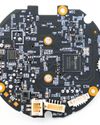
Dungeons and Dragons is a complex, fantasy role-playing game, in which various players roll polyhedral dice with 4 to 20 faces to determine outcomes at various decision points. Andrew describes an electronic device he created to simulate rolling the dice using a Raspberry Pi RP2040 MCU, a TFT with touchscreen to show the rolling dice and display the scores from each roll, and an STM amplifier to add the element of drama with sound effects.
My daughter is a big fan of Dungeons and Dragons, the fantasy role-playing game. This game has been around since the 1970s but has become hugely popular during the last few years. One of the key aspects of the game mechanics is the use of polyhedral dice to decide the outcome at various decision points. A typical set of dice, shown in Figure 1, includes seven dice. Six with 4, 6, 8, 10, 12, or 20 faces (designated D4, D6, and so on), along with a second, 10-faced die, the "percent" die. As the name suggests, the "D%" die is used together with the D10 to get a score ranging from 1 to 100 percent; one die gives the tens digit and the other gives the ones digit.
There is sometimes a requirement for a Yes/No decision. This can be done in various ways - for example by using a D6 and designating odd numbers to indicate a No and even numbers a Yes, or by using a special coin-like token. There is frequently the requirement to roll several dice and use the sum of their values to determine game outcomes.
If you look online, you will see that a plethora of beautifully decorated D&D dice sets are available. The die-rolling experience is an integral part of the enjoyment of the game, and the dedicated D&D aficionado will have several sets to choose from.
Esta historia es de la edición November 2024 de Circuit Cellar.
Comience su prueba gratuita de Magzter GOLD de 7 días para acceder a miles de historias premium seleccionadas y a más de 9,000 revistas y periódicos.
Ya eres suscriptor ? Conectar
Esta historia es de la edición November 2024 de Circuit Cellar.
Comience su prueba gratuita de Magzter GOLD de 7 días para acceder a miles de historias premium seleccionadas y a más de 9,000 revistas y periódicos.
Ya eres suscriptor? Conectar

New TI MCUs Enable Edge AI and Industry-Leading Real-Time Control to Advance Efficiency, Safety, and Sustainability
Texas Instruments (TI) introduced two new series of real-time microcontrollers that deliver advancements to help engineers achieve more intelligent and secure processing in automotive and industrial applications.

Using Amazon Alexa to Control Custom IoT Gadgets
In part two of his article, Brian describes integrating custom IoT gadgets with Amazon Echo using emulation to receive spoken alarms. In part one, he used emulation and Arduino Cloud services as a middleman.

Holiday Hangover Hardware Hacking
Having too much cheer during the holidays? In this month's article, Colin offers a diversion from the jolly season by urging developers to retreat to the basement to brush up on hardware hacking skills. He shows how a low-cost Raspberry Pi Pico and a TP-Link Tapo C200 smart IP camera could become the next automated bird deterrent or a home automation server.

Datasheet: Microamps Per Megahertz Ultra-Low Power MCUs Minimize Current Consumption
How do chip makers differentiate if many ultra-low power MCUs on the market feature the same processor core? The peripherals and different power states offer various ways to manage current consumption down to microamps per megahertz.

Smart Home Lock Down Matter Provides Security Blanket
As more devices in the smart home connect to the Internet, they become increasingly vulnerable to outside attacks. Developers can now add the latest security measures to their Smart Home devices through Matter.

Basic Pulse Circuits
In part one of a three-part series, Wolfgang wrote how basic pulse circuits help digital circuits, such as embedded boards with ARM processors, deal with pulse trains or bursts of pulses from the outside. In Part 2, he dives into enabling flip-flops, timing parameters, and synchronization, design tasks needed to capture, detect, and filter pulses.

Building a Wi-Fi Router Watchdog
Dev created a watchdog for a Wi-Fi extender using a Raspberry Pi Pico. This monitors Wi-Fi connectivity for his smart home lighting system, which would require a reset twice a year due to rapid power interruptions.

Create Your Own PCBs with a CNC Milling Machine
Using KiCad, CopperCAM, and Candle Software

Performance Bottlenecks in Embedded Linux Solutions Analysis, Identification, and Mitigation
Good performance is a requirement for every technology, and system designers rely on operating systems to ensure fast and smooth transitions in critical applications. Fortunately, Pedro writes, the embedded Linux OS offers ways for finding, analyzing and mitigating performance bottlenecks so embedded systems can deliver the speed and efficiency that end users expect.

Renesas New RA8 Entry-Line MCU Groups Brings High Performance of Arm Cortex-M85 Processor to Cost-Sensitive Applications with Market-Leading CoreMark Performance
Renesas Electronics Corp., a premier supplier of advanced semiconductor solutions, introduced the RA8E1 and RA8E2 microcontroller (MCU) groups, extending the industry's most powerful series of MCUs.